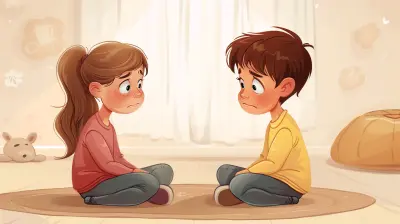Finding Hope After Loss: Rebuilding a Life After Grief
14 September 2025
Grief has a way of turning our world upside down. One moment, life feels relatively normal, and the next, it feels like someone pulled the rug out from under us. Whether it's the loss of a loved one, a relationship, a pet, or even a job, grief doesn’t just affect our emotions—it shakes our identity, our routines, and our sense of security.
But here's the good part: there is a way forward. It doesn’t mean forgetting. It doesn’t mean moving on in the way people often suggest. It means rebuilding—and finding hope again, piece by piece.
Let’s walk through this together. 💛
What Grief Really Feels Like
Let’s be real—grief isn’t just sadness. It’s a tangled ball of emotions: anger, confusion, despair, even numbness. Some days you might cry for hours, and other days you might feel... nothing. And that’s okay.You can think of grief like waves in the ocean. Some waves are small and just touch your toes; others knock you down without warning. But over time, those waves do get gentler. Not because your loss becomes smaller, but because your heart becomes stronger.
So if you’re riding a massive wave right now, just know—it won’t always feel this intense.
The Myth of "Moving On" (And Why You Should Ignore It)
Ever hear someone say, “It’s time to move on”? It’s usually well-meaning, but ouch—it stings. The truth is, we never completely "move on" from a deep loss. You don’t erase love like a chalkboard.What we do instead is carry our grief with us as we rebuild. Like a crack in a beautiful vase that tells a story. You might not be the same, but you're still whole—maybe even stronger.
Think of it as moving forward, not "on".
The First Steps: Allowing Yourself to Feel
Before anything else, you’ve got to create space to feel what you feel.Grieving isn’t weakness. Crying doesn’t make you broken. Emotion is human, and allowing those emotions is a form of strength.
Feel like screaming into a pillow? Do it.
Need a quiet day under the covers? Take it.
Want to talk for hours or say nothing at all? That’s your call.
There’s no one-size-fits-all. Grief isn’t linear—it’s messy, unpredictable, and deeply personal.
Leaning Into Connection: You Don't Have to Do This Alone
One of the biggest lies grief tells you is that you're alone. But you're not. Even though it can feel like the world moved on and forgot, there are people—friends, family, even online communities—who want to show up for you.Let them.
Pick up the phone. Send the text. Join that support group. You’d be surprised how healing it is just to hear someone say, “Me too.”
Talking about your loss doesn't reopen the wound. It lets in light.
Creating Routines: A Gentle Path Back to Stability
When you're deep in grief, the world often feels chaotic. Your routines might be all over the place, and that's normal. But at some point, reintroducing structure can help bring a sense of comfort and purpose.Start small. Really small.
- Make your bed.
- Take a walk every morning.
- Brew your favorite tea each afternoon.
You’re not rebuilding your whole life overnight. You’re just lighting small candles in the dark, one by one.
Finding Meaning in the Memories
Here’s a beautiful truth: the people and things we lose don’t just disappear—they live on in us.Talk about them. Write about them. Look through photos. Laugh at old memories. Celebrate anniversaries in your unique way.
This isn’t about living in the past. It’s about honoring and carrying love with you as you move forward.
Allowing Joy Back Into Your Life (Yes, It's Allowed)
Guilt can be sneaky. It whispers things like, “If you’re smiling, you must not be grieving hard enough.” But joy and grief can absolutely exist in the same heart.In fact, allowing in moments of joy is a tribute to the life or love you lost. They would want you to smile again. You deserve light, even after darkness.
So go ahead—laugh at that silly movie. Dance in your kitchen. Say yes to an adventure. You aren’t betraying your loss; you’re embracing your resilience.
Reconnecting With Yourself
Loss can make us feel like we’ve lost part of our identity too. Who am I without them? What do I even like anymore?This is where rediscovery begins.
Take this time to gently explore what fills your soul now. Maybe it’s painting, journaling, traveling, or just sitting by the window with your thoughts. Try new things. Say yes more often. Say no when it matters.
You’re not just rebuilding—you’re becoming. The new version of you might even surprise you.
When Grief Becomes Too Heavy: Seeking Professional Help
Sometimes grief gets stuck. It might start affecting your sleep, your relationships, or your will to do anything at all. That’s not something to "tough out." That’s something to talk about with someone trained to help.Therapists, grief counselors, and mental health professionals are not just for “serious cases.” They’re for everyone who’s navigating a storm and could use a compass.
Asking for help doesn’t mean you’re broken—it means you’re wise enough to want healing.
Little Things That Bring Big Hope
You don’t need a grand, life-changing epiphany to heal. Often, it’s the tiny things that make the biggest impact.- A warm sunrise
- A kind word from a stranger
- A familiar song
- A deep breath of fresh air
Collect those little moments like seashells. Let them remind you that life still holds beauty, even in the cracks.
Rebuilding Isn’t Linear—And That’s Okay
Let’s squash a myth right now: healing doesn’t look like a straight line. It looks more like a messy squiggle. You’ll have good days and rough days, and that’s a normal part of the journey.The trick is not to judge yourself when the grief resurfaces. It’s not failure—it’s just another wave. And you’ve already made it through so many of them.
So be patient with yourself. Keep moving—sometimes inching, sometimes leaping—but always forward.
Writing Your Next Chapter
So where does hope come in? Right here.Hope is not some magical fix. It doesn’t erase grief. But it does remind you that there’s more ahead. More laughter. More connection. More love.
You’re not closing the book on what you lost. You’re turning the page, slowly, gently—writing the next chapter with both tears and smiles.
And guess what? This new chapter can still be beautiful.
Final Thoughts: You Are Not Alone
If you’ve read this far, take a moment to breathe. You’re doing better than you think.Grief is hard. Rebuilding is even harder. But inside you is a quiet, steady strength that deserves to be honored. Don’t rush it. Don’t silence it. Just take it one soft step at a time.
You’re still here. You’re still growing. And yes, hope is still possible—even after loss.
all images in this post were generated using AI tools
Category:
Grief And LossAuthor:

Eliana Burton
Discussion
rate this article
1 comments
Elle Huffman
This article beautifully captures the journey of healing after loss. It’s a reminder that while grief is profound, hope and rebuilding are possible with time, support, and self-compassion.
October 17, 2025 at 3:30 AM

Eliana Burton
Thank you for your thoughtful comment! I'm glad the article resonates with you and highlights the importance of hope and healing.


